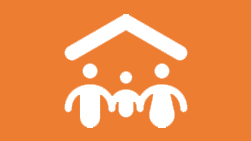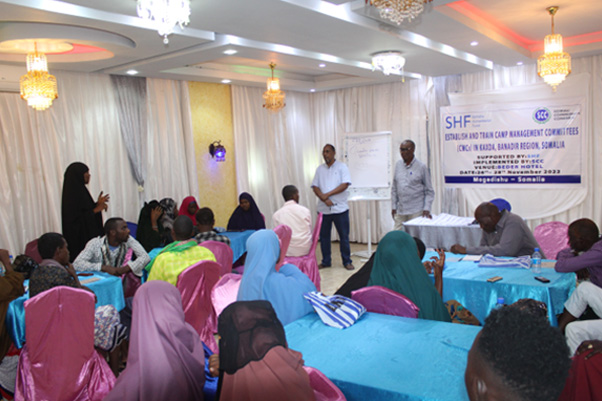Camp Coordination And Camp Management

In 124 locations and communities, SCC has been enhancing the living conditions of internally displaced people (IDPs), guaranteeing fair access to services, and providing aid to anybody in need in the Kaxda and Daynile District of Mogadishu.
Our Camp Coordination and Camp Management (CCCM) aims to ensure equitable access to assistance, protection and services for persons living in displacement sites.
It focuses on improving the living conditions of people during displacement while seeking and advocating for durable solutions to end camp life and organize the closure and phase-out of camps.

The main activities include
- Ensuring that IDPs have an uninterrupted access to basic services through continuous coordination with relevant stakeholders and the monitoring of quality of services.
- Levelling of ground and sites preparation to mitigate the risk of flooding during rainy season,
- Creating community spaces and maintenance of existing sites.
- Leadership structures, representing all segments of population (men, women, youth, elderly, disabled and other vulnerable people) in IDPs sites are strengthened through trainings on CCCM concepts and best practices and better involvement in decision making regarding site management and development
SCC's CCCM activities seek to improve field response in displacement sites, provide support to national authorities and link assistance to host communities, which may also be hosting displaced persons among the population and have specific needs.
It widens the understanding and adoption of the CCCM approach through the CCCM Cluster's training of national authorities prior to an emergency, and work with partners for improved humanitarian responses that contribute to disaster risk reduction or strive for holistic area-based community support.
SCC has also partnered with IOM and SHF and Local Authorities authorities in KAXDA implemented CCCM Capacity Building programs by training key government offices and adapting the CCCM training materials to national legal and linguistic context.
Lastly, in many settings, SCC's Displacement Tracking Matrix , has supported the identification of hidden displaced populations by collecting information on remote camp populations multi-sectoral needs and gaps in essential services.
Where SCC is directly implementing camp management operations, SCC's CCCM program typically collaborates with other program sectors within SCC's emergency such as Shelter, WASH, and Protection.
At the core of these activities stands SCC's commitment to raise accountability to affected populations. SCC's commitment to preventing and mitigating Gender-based Violence in emergencies including in camps and camp-like settings is captured in the Institutional Framework for Addressing GBV in Crises (GBViC Framework).
Addressing gender-based violence in CCCM operations / Protection from gender-based violence in CCCM operations
Gender-based Violence (GBV) occurs in all crises where SCC operates. GBV interventions refer to core crisis programming activities that can remedy, mitigate or avert direct loss of life, physical or psychological harm and threats to a person's dignity and well-being.
Therefore, specific measures and interventions to mitigate, respond to and prevent GBV must be undertaken from the onset of a crisis and continue through transition and recovery efforts in all SCC sectors and programmes.
Crisis operations that do not take into account vulnerabilities to GBV can in fact exacerbate the risk of GBV and represent a failure on the part of SCC to fully promote, respect and protect the rights of affected populations, especially women and girls.
Projects impact:
A total of 35488 families have been reached so far in Kaxda of Banadir Region. These families were mainly new arrivals displaced from Lower Shabelle, Bay and Bakool regions.
SCC partnering with IOM and SHF have carried out 5 projects in the last 4 years (2020 -2023) in Kaxda district of Banadir region.
